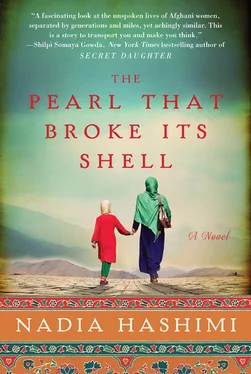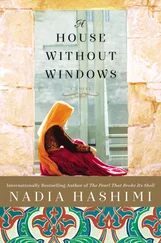She came over and hugged us, greeted us warmly. Sufia, her confidence growing, practiced her English and asked her how she was doing, how her family was getting along.
“Why isn’t anyone else here?” I whispered.
“Not interested. They just show up to the sessions and then go home. No one cares to learn anything new. They think they know what they’re doing, even though they’ve never done it before. Born experts!” Hamida laughed.
The ladies introduced me to Ms. Franklin and explained to her that I was an assistant to another parliamentarian. She seemed thrilled to have me there. I stared at her light brown hair, soft bangs peeking out from under her head scarf. She looked to be in her thirties, with a brightness in her eyes that made me think she’d never experienced sadness.
If that’s true, lucky her, I thought.
“ Salaam-alaikum, Rahima- jan, ” she said, her accent so thick it made me giggle. “ Chotoor asteen? ”
“I’m fine, thank you,” I answered, and looked at Hamida. I’d never before seen an American. I was amazed to hear her speak our language. My reaction looked familiar to Hamida.
“Her Dari is good, isn’t it?” she laughed. “Now, dear teacher, what can you show us today?”
We spent almost two hours there, Ms. Franklin patiently guiding us through the basics of using a computer, guiding the mouse across a table to move a pointer on the screen. I was thrilled, feeling an excitement I hadn’t felt since my days as a bacha posh .
Imagine if I learned to use this machine. Imagine if I could work like this woman, Ms. Franklin. To know so much that I could teach it to others!
I felt privileged. A new feeling! I doubted even Hashmat had ever seen a computer, much less received personalized instruction on how to use it. I would have loved to see the look on his face if he ever learned what I was doing in Kabul.
But it was going to get dark soon and it was time to leave. The women had promised Badriya that one of them would escort me back to the hotel with her guard and driver. I hugged Ms. Franklin before we left, making her laugh out loud, her blue eyes twinkling with kindness.
“I want to come back here, please! I like it very much!”
If only our day had ended with that sentiment.
Sufia had a hand on the door when a large explosion startled us all. We dropped to the ground, out of the way of windows. Nervous stares.
“What was that?”
“Something. Couldn’t have been too far. But it didn’t sound like a rocket.”
We were a people of war; explosions were familiar to our senses. But not for Ms. Franklin. Her face drained of color and she was shaking. Hamida put an arm around her young teacher, trying to reassure her. Sufia squeezed my hand. No other sounds came. Sufia got up cautiously and went to the door. People in the street were yelling, pointing. Her driver and guard jogged over to the door. They looked frustrated. They were panting.
“What is it? What’s happened?” she asked.
“Some kind of bomb. Looks like it was right by the parliament building. Stay here. We’re going to find out what happened.”
We were huddled by the window, trying to read the faces of the pedestrians. Hamida called out into the street.
“What’s going on? Was that a bomb?”
The street was chaotic. Either no one heard her or no one bothered to answer.
We inched out the door, our curiosity overwhelming. I was nervous. Although my father and my husband had been in the throes of battle, the war had always been at least one village away from me. I wondered if Badriya was anywhere near here.
Sufia’s driver came back, shaking his head and muttering something under his breath. Hamida’s guard stopped him, wanting to know what he’d found out.
“It was two blocks from the parliament building. A bomb in a car. Looks like they were trying to get Zamarud.”
My stomach lurched. I pictured her storming out of the building, remembered the hateful leers she’d drawn from some of the men. Even some of the women had shaken their heads as she walked by. People thought she was out of line, and the punishment for being out of line was severe in our world. It always had been.
“Zamarud! Not surprised, with the finger-pointing she’s been doing. This isn’t good. Is she all right?”
“I don’t know. Someone said she was killed. They took her away. I didn’t see her there, or her guards. We’d better get out of here.”
When Abdul Khaliq got wind of what happened, he told his driver and guard to bring us back to the compound. The bombing had scared me badly. Badriya and I stayed in our hotel room, afraid that other women parliamentarians would be targeted, and heard a hundred versions of yesterday’s events from our guard and the hotel staff.
She was dead. She was alive but had lost a leg. She was unscathed but three children walking by had been killed. It was the Taliban. It was a warlord. It was the Americans.
I didn’t know what to believe. Badriya believed each and every story wholly until the next one came along. My head spun. I prayed for Zamarud, thinking there was something inspiring about the way she had riled the entire parliament with her irreverent behavior. The guards came back; our driver was smoking a cigarette, his eyes red from the lingering smoke of the bomb. He’d been too curious to walk away. When he nodded that the car was ready, I sighed with relief. I wanted to hold Jahangir.
I imagined how my little boy might squeal and laugh when he saw me, how he might run to my arms. I couldn’t wait to hold him, praying he didn’t hate me for leaving. Though I regretted thinking it, I hoped I wasn’t like my mother. I didn’t want to abandon him and leave him to raise himself. I opened my small bag and checked for the ballpoint pen and a few sheets of paper I’d taken from the parliament building. I smiled, thinking how happy it would make Jahangir to scribble.
My son was the bright spot in my return to the compound. I went directly to Jameela’s room and called his name. He froze at the sound of my voice and toddled to greet me at the door, an innocent grin on his face and a twinkle in his eye.
“ Maa-da! Maa-da! ”
My heart melted to hear him call for me.
“Play ball outside! Maa-da! ”
He wasted no time trying to recruit me to play with him. I smiled, wishing I could join him in the courtyard, where we could kick his brother’s soccer ball back and forth. I was close enough to childhood that playing still appealed to me. But they had just killed a chicken for Abdul Khaliq’s dinner guests and there was little time to pluck and clean the bird for tonight’s dinner.
“Forgive me, bachem, but maybe later I can come outside with you. Right now I have to get some work done. Maybe your brother can go outside with you.”
I think I secretly hoped that my work in Kabul would change how I was treated at the compound, but that idea was quickly dispelled. Bibi Gulalai stopped by the next day to make sure my time in the city hadn’t undone all the work she’d put into me.
“That was Kabul, this is here. In this house, remember who I am. There are no meetings or papers for you to look after here. Now go wash your face. You look filthy. How embarrassing.”
I sighed, nodded and walked away before she talked herself into a worse mood on my account.
I kept to my room. My last night here with my husband had been exceptionally unpleasant, exceptionally violent, and I didn’t want to put myself in his way again. I wondered if he’d let us go back to Kabul after this. I still didn’t know if Zamarud was alive or dead.
And something was happening at home. I didn’t know what it was but Jameela looked anxious and distracted. She was polite with Bibi Gulalai but she would quickly excuse herself. Bibi Gulalai seemed to be surveying our home with a discriminating eye. I asked Jameela but she smiled and changed the subject. Shahnaz, bitter because I had been allowed to travel to Kabul, was curt and snide with me. There was no use approaching her.
Читать дальше












